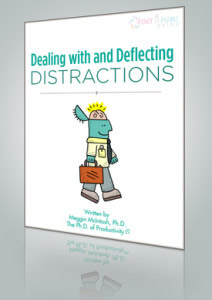Dealing with Interruptions by Meggin McIntosh, Ph.D.
 Recognize that essentially everyone’s job involves interruptions of one type or another. We can acknowledge that and still figure out ways to keep the interruptions from wreaking havoc on the rest of our work.
Recognize that essentially everyone’s job involves interruptions of one type or another. We can acknowledge that and still figure out ways to keep the interruptions from wreaking havoc on the rest of our work.
- Define your job and if it is dealing with interruptions, then read no further. The reason I had to put this first is because I have had people in my workshops who are receptionists or work at the front desk of an office at a school – and then wonder what to do about interruptions. Frankly, if there were no interruptions and you were the receptionist, then you wouldn’t have a job. So, I will assume that if you are reading on to the next nine tips, it’s because you know that your whole job is not defined as dealing with interruptions!
- Chart where your interruptions are coming from. If you would like a chart I created that is set up for this, just click here and you can freely access it. You’ll go through my shopping cart and then be redirected to a webpage where you can download it (free).
- If your interruptions come from your telephone, turn it off for a portion of everyday. That includes your cell phone, your office phone, or your home phone – wherever the telephone interruptions come from. Note: I know one should not have to say this to teachers, but you know and I know teachers who answer the phone throughout the day, including while their students are there.
- If your interruptions come from your email, turn it off for a portion of everyday. Hello?!
- If your interruptions come from people who come to you because they don’t have the information that they need and you can determine a pattern, figure out a way to proactively get them information so that they do not have to interrupt you to get it.
- If your interruptions come from people walking by, then either close your door, or if you are in a high traffic area, figure out if there is some way to indicate that you are not to be disturbed or find a different place to work – at least part of the time. If your classroom is right next to the office or the teachers’ workroom/lounge, you will need to set some boundaries about people “dropping by.”
- If your interruptions are because you are essentially inviting people into your work space because you have candy on your desk…well, what can I say? Get the candy off your desk and begin to make it known that you heard that candy on someone’s desk increases the number of times they are interrupted by 80% and reduces their productivity by 2 or more hours a day. Note: I actually just made that up, but you can say you heard this statistic…because you just did. And while I may have just invented that statistic, based on my experience working with people all over North America, I would say it is not far off.
- Stand up when people come into your workspace. Conversations that are held standing up are much shorter than those that are held sitting down. And interestingly, if you need to get off the telephone, standing up helps that happen, as well.
- Tell people the truth. If you are busy, tell them you are busy. Physically hold up your hand when someone starts coming into your workspace and say, “Hang on. I am right in the middle of something. Could I get back to you later today?”
- Check to see if you are co-dependent in some way. If you love being the go-to person, then you are encouraging interruptions and you will need to begin to help others take responsibility.
Although this is an idea that is used in elementary schools, I love it for adults, too. “Three before me” is a phrase that teachers of young children say. The idea is that children are to ask three other people before they come to their teachers with a question. You could install that notion with the students and the adults in your life, too. “Please check with “three before me,” and then, and only then, come to me if you have not been able to find a suitable response.”
 If you liked these writing tips, you may be interested in the Get a Plan! Guide® for Dealing with and Deflecting Distractions. It’s specially designed so you can accomplish your goals more smoothly (i.e., peacefully, productively, and predictably). You’ll learn ways to take stock of your distractions, along with 6 means to eliminate – or at the very least, minimize – those distractions. I promise that you will have a plan that you can implement starting today.
If you liked these writing tips, you may be interested in the Get a Plan! Guide® for Dealing with and Deflecting Distractions. It’s specially designed so you can accomplish your goals more smoothly (i.e., peacefully, productively, and predictably). You’ll learn ways to take stock of your distractions, along with 6 means to eliminate – or at the very least, minimize – those distractions. I promise that you will have a plan that you can implement starting today.


